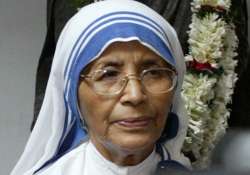Sister Nirmala: An able bearer of Mother Teresa's legacy
Kolkata: Simple and unassuming, but gifted with tremendous inner strength born out of her deep spirituality, Sister Nirmala deftly carried on Mother Teresa's legacy by extending the footprint of the Missionaries of Charity in new

Kolkata: Simple and unassuming, but gifted with tremendous inner strength born out of her deep spirituality, Sister Nirmala deftly carried on Mother Teresa's legacy by extending the footprint of the Missionaries of Charity in new geographies while ensuring strict adherence to the Catholic congregation's core motto of serving the poorest of the poor.
Sister Nirmala, who succeeded the Nobel Peace Prize winner as the second superior general of the Catholic religious order on March 13, 1997, months before the Albanian nun's demise, passed away here early on Tuesday. She was 81.
During her 12-year stewardship of the Kolkata-headquartered Missionaries of Charity founded by the Mother in 1950, Sister Nirmala visited a large number of countries, opening new Houses and drawing more people to the religious order, which now has under its fold over 4.500 religious sisters and activities spread across 133 countries.
Born Nirmala Joshi at Ranchi in 1934 to a hindu Brahmin family that hailed from Nepal, Sister Nirmala was educated in a Catholic missionary school.
At the age of 17, while waiting at a bus stop, Sister Nirmala first felt "Jesus was alive in my heart". Her inner turbulence continued for seven years, but the gory scenes of the Hindu-Muslim riots at the time of partition in 1947 proved the game changer in her life.
She came to Kolkata (then Calcutta), and met Mother Teresa, who had started her religious order takin care of the poor and the dying.
"It was inspiration at first sight," Sister Nirmala, who held a post-graduate degree in political science and was a trained lawyer, later recalled in an interview.
The 24-year-old converted, becoming one of Mother Teresa's earliest disciples, and immersed herself in the MoC's services.
She was sent to supervise MoC's centres in Europe and the United States, besides Panama, but came back in 1976 to start the MoC's contemplative branch - that spent more time with the Eucharist as against the Active branch, which catered to the poor and the needy.
But with her advancing years, the mother turned frail and unwell, and Sister Nirmala was elected the MoC head on March 13, 1997. The Mother breathed her last on September 5 the same year.
It is believed the sisters who formed the electoral college opted for Sister Nirmala over nuns more experienced in administration for her holiness and deep spirituality.
"She carried on the Mother's legacy very well indeed. New houses were opened in many countries. She was diminutive, simple and unassuming, but very strong inwardly. When she spoke, she spoke with conviction. There was real power in her words," said the Archbishop of Kolkata, Thomas D'Souza.
Nirmala's strong mental make-up came out beautifully during an interview she gave to Catholic World News over a decade back.
Asked about the problems the MoC was facing, Sister Nirmala laughed it away. "We cannot look at problems as 'problems'. Problems are gifts of God. If you look at them as problems, they will be problems, but if you look at them as gifts of God, they are challenges, and we always welcome challenges. So they are challenges, not problems."
She also said there was nothing called "obstacles". "No, nothing is an obstacle. How you take it is what matters."
Sister Nirmala was elected as MoC superior general for a second term in 2003.
She was re-elected for a third term on March 13, 2009, but wanted to be relieved of the responsibility owing to ill-health and also expressed a desire to return to the contemplative life she led before heading the order.
Days later, the MoC held a second election, and chose the German born sister Mary Prema as Sister Nirmala's successor.
Sister Nirmala returned to the contemplative branch, spending her last days in meditation at the MoC's Ahome near the bustling Sealdah station in central Kolkata.
"She earned everybody's respect. Her advice everybody heeded," said D'Souza.
In recognition to her services to the nation, sister Nirmala was bestowed the nation's second highest civilian honour, the Padma Vibhushan, in 2009.
But what endeared Sister Nirmala to all was her uncluttered view of people and the world and ability to find joy in the smallest of things.
During Christmas and Easter, Sister Nirmala used to prepared small, handwritten messages and asked people to pick up one of them.
D'Souza recalled the messages used to be very poignant, very simple. "For example, she would write 'You must be more kind'. And she would always ask people to read them out to her. And she was delighted to hear what one got."